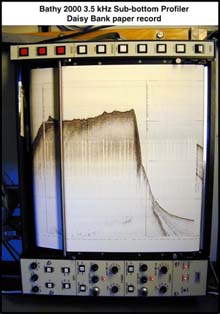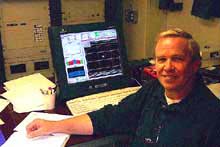
Here is an example of a tool used to study the bottom of the seafloor. Bob Pearson has been onboard to witness these advanced technologies. Click image for larger view.
Teacher Perspective
Robert (Bob) Pearson
High School Teacher
Lincoln County School District, Toledo, Oregon
To be an active participant in a multi-disciplinary exploration and discovery project of this scope and caliber is a dream for many scientists, not to mention a high school teacher. Watching high expectations of new discovery become realizations of newly acquired knowledge, as it has been for the scientific explorers on this voyage, is the very essence of what motivates one to choose the teaching profession in the first place. Being witness to the science, technology, discovery, and the teamwork of people who make science happen is an invaluable experience and enrichment, which can not help but change the way science is taught in the classroom.
Just as this exploration brings together scientists from many science disciplines, so too can teachers of differing instructional disciplines benefit and utilize the information and discoveries this project produces. The curriculum specialties of teachers allowed such access and experience are where the possibilities of influential and meaningful links to the classroom lie. There are, of course, the expected science teacher links in the methods, tools, and concepts used in accessing and understanding the discoveries. For example, the lessons may be based on the difficult thinking skills of three dimensional visualization based on two dimensional views, to the mathematical and geometrical relationship between the transducer array angle and swath area of coverage of the ocean floor in swath mapping for seafloor bathymetry.
Science, however, is not the only educational discipline that can benefit from results and methods of this exploration. Among those instructional disciplines are the geography teacher in a mapping unit, the social studies teacher in a unit on historic indigenous cultures, a computer applications teacher using Geographic Information Systems (GIS) type software, and a math teacher utilizing real, rather than abstract problems in a classroom.
All of these disciplines could easily apply the excitement of these recent discoveries to new and relevant knowledge and discovery in their respective classes. All would walk away from this experience a better teacher from it. Allowing teachers this opportunity of expanding their personal and professional understanding of what science is, and how science is done, directly affects those with whom they have the most contact and positive influence - their students.

Bob Pearson has experienced first-hand many aspects of ocean exploration. Click image for larger view.
Sign up for the Ocean Explorer E-mail Update List.




